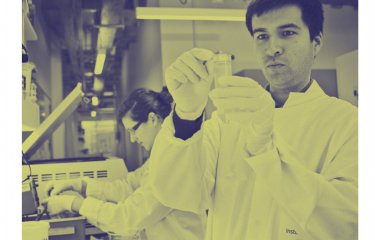This awareness week on antibiotics (18-24 November 2019) is an opportunity to focus on the major public health challenge of antibiotic resistance and to highlight the Institut Pasteur's efforts to demonstrate the importance of this issue. Sixty of its research teams are currently working on the subject.
November 18 is European Antibiotic Awareness Day. From 18 to 24 November 2019, is the world week for a good use of antibiotics. And given the challenge of antibiotic resistance, "a paradigm shift is required", as the Institut Pasteur's President Stewart Cole reiterated during a round table held at the Institut Pasteur in September on the economic context of the fight against antibiotic resistance. At the event, Lord Jim O'Neill, an economist and author of the May 2016 report that played a decisive role in raising political awareness of the problem of antimicrobial resistance, stated "If this were one of the factors to affect countries' credit ratings, everyone would start paying attention." (See the Research Journal news)
Antibiotic efficacy threatened by resistance to treatment
Antibiotics are used to combat infections caused by bacteria, including pneumonia, bronchitis, ear infections, meningitis, urinary tract infections, septicemia and sexually transmitted diseases. The discovery of antibiotics was a major milestone in medicine that has saved and continues to save millions of lives every year, but their effectiveness is threatened by the ability of bacteria to adapt and resist treatment (see the Institut Pasteur's Antibiotic resistance disease fact sheet).
Antimicrobial resistance: a priority scientific area for the Institut Pasteur
Every year, around 700,000 people die across the globe as a result of resistance to the various antimicrobial drugs currently available to treat bacterial infections such as tuberculosis, HIV, malaria and fungal infections. This health challenge is a major concern for the Institut Pasteur, which has identified it as one of the priority scientific areas in its 2019-2023 Strategic Plan.
"Tête à Tête" with Stewart Cole: the Institut Pasteur's Strategic Plan.
The Institut Pasteur on the front line of the fight against resistance
- At the Institut Pasteur, more than 60 multidisciplinary teams are exploring new avenues for fighting resistance and developing new antimicrobial agents. (Read the press kit, in French)
- In late October 2019, the Pasteur iGEM team took part for the fifth time in the International Genetically Engineered Machine (iGEM) competition run by Massachusetts Institute of Technology (MIT) in the United States. The team presented its project "DIANE, Diagnosis is Now Easier", a portable rapid diagnostic device that immediately informs doctors of the bacteria responsible for an infection based on a human fluid sample (blood, saliva or urine). (Read the news article)
- On November 2, 2019, the documentary L'incroyable histoire des tueurs de bactéries (The Incredible Story of The Bacteria Killers) was broadcast on Arte. Laurent Debarbieux, from the Institut Pasteur's Molecular Biology of the Gene in Extremophiles Unit, features in the film, which looks at the history of phage therapy, a possible alternative avenue for treatment in the light of increasing bacterial resistance. The documentary is available on VOD on ARTE until December 31, 2019.
The Institut Pasteur meets the public at the Pariscience festival
The Pariscience festival is an event that blends science and film, with free public screenings of a selection of the best recent French and international scientific documentaries. On October 28, 2019, Philippe Glaser, Head of the Institut Pasteur's Ecology and Evolution of Antibiotic Resistance Unit, attended the screening of the film Resistance Fighters at the festival, then took part in a debate alongside the film's director Michael Wech.
Resistance Fighters, a compelling "science-thriller" that investigates the phenomenon of antibiotic resistance, won the "Grand Prix AST-Ville de Paris" award. The documentary offers an alarming wake-up call about the severity of this still poorly understood subject and points the finger at modern farming methods and the widespread use of antibiotics.
During the discussions with the public, Philippe Glaser played down the role of agriculture and shared his more optimistic perspective for the future: "The work by Jim O'Neill (former UK Commercial Secretary to the Treasury, economist and author of the aforementioned report on the subject, who also features in the film) has already borne fruit. Since 2016, several action plans and research plans have been adopted to combat antibiotic resistance. In many countries, including France, very strict surveillance and hygiene measures are already in force to limit the possible spread of resistant bacteria. But to tackle the phenomenon of antibiotic resistance effectively, we need to adopt a comprehensive, global outlook."
This study is part of the priority scientific area Antimicrobial Resistance of the Institut Pasteur's strategic plan for 2019-2023.
For more information, please visit





